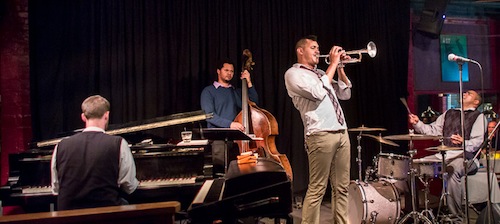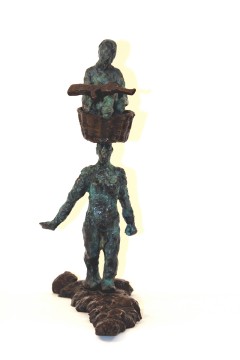Music Jake Uitti — November 14, 2013 10:59 — 0 Comments
One Super Important Question for Ahamefule J. Oluo
One morning I was cruising Facebook and saw a post from Ahamefule J. Oluo saying, “I just want to say. The new [Industrial Revelation] album comes out next month… We put out one track, people didn’t seem to notice, we will put out another track and it may go unnoticed but it doesn’t change the fact that we are the best band in Seattle and if you disagree, come to a show and then reconsider.â€Â
So, naturally, I wanted to hear the new record. I contacted Aham, who generously sent me a copy. And it’s crazy good. IR writes and performs music, in the Duke Ellington sense of the word. We at The Monarch Review wanted to reach out to Aham and ask One Super Important Question.
Jake Uitti: What elements came together – what was the process – from the beginning stages of the band all the way to producing the new record, Oak Head?
Ahamefule J. Oluo: Industrial Revelation has been a band for a very long time. In a certain way, the four of us really learned how to be musicians while in each other’s company. D’Vonne and I first played together about 15 years ago. I was 16 or 17 at the time and D’Vonne was even a couple years younger than that. I had hired him for my second gig ever in an act of desperation. I did not know very many good musicians and although I had lucked out in finding all of the other musicians for the band, I had run out of leads for accomplished drummers who were both highly skilled and also didn’t mind playing with a bunch of teenagers. My last hope was a slip of paper that had been handed to me, unsolicited, by an acquaintance I ran into at a jam session. The acquaintance (a professional trombonist with decades of experience) did not know I was looking for a drummer, but had been so impressed by a 14-year-old drummer he played with earlier that day, he was telling everyone he knew about the kid. With no time to hear him play, I hired him for the gig. With great fear and skepticism, brought about in part by the fact that D’vonne did not own a drum throne and instead carried around a battered wooden stool, I counted off the band 1-2, 1-2-3-4….and on the downbeat, with one strike of a stick to a cymbal, every fear was washed away. I had never before felt so comfortable playing with another musician and I immediately knew that playing music with D’Vonne would be essential to my development as an artist.
In 2004, I took some time off from playing music. I already had two kids by this time and felt like it was my duty to give up my artistic aspirations and focus on the financial security of my family. I worked for the phone company and I was almost as miserable as I have ever been. After 7 or 8 months passed without touching my horn, I was driving and I turned on the radio. I didn’t know who was playing, but the drummer was blowing my mind–the feel was so tasty, the playing was so consistently interesting and I literally thought to myself, “If I could play with a drummer like that, I would never quit playing again.” The song ended. Jim Wilke, the host of the radio program, announced that I had been listening to a live recording of the Larry Fuller trio featuring Phil Sparks on bass and D’Vonne Lewis on drums.
I immediately called D’Vonne and told him that I wanted to play together soon; he informed me that he was playing a gig that afternoon and invited me to sit in. I went home, oiled the stuck valves of my neglected horn, and made my way to the club. I sat in for one song–the last song of the first set. It felt magical. Immediately afterward, D’Vonne and I went outside to get some fresh air and at that moment decided to start a band.
We both immediately suggested Evan Flory-Barnes on bass. Evan is a couple years older than us and I had admired him as a musician for quite a long time. I was intimidated by the skill and unwavering confidence with which he played his bass; when I was about 15 and Evan an old man of 19 or so, I would go watch him play with the Aaron Parks Trio at a Tully’s downtown. It wasn’t even so much that I desired to play with Evan–it is more that I desired to be good enough to play with Evan. That’s a desire I still have.
D’Vonne next suggested Josh Rawlings on keys. I had gone to college with Josh years earlier, but didn’t really know him and, frankly, hadn’t been a fan of his playing at the time. I was reluctant to believe D’Vonne that Josh was the right person for the job, but I hesitantly agreed to give him a shot for at least a rehearsal. We rehearsed at Cornish, where Josh and I had studied. We ran through a couple original tunes and quickly discovered a breathtaking chemistry–a chemistry that existed independent of our will, a chemistry that controlled us and not the other way around. Josh made me feel embarrassed about ever doubting him, to the point that I questioned the reliability of my ears. Evan weaved in and out of the music only to leave the room shaking with the bombs dropped from his low E string. My mind felt outside of my head. And with that, we were a band.
Oak Head: As I said before, we have been a band for a long time. This band has outlived two marriages for me. We have all joined and quit countless other bands over the years, but IR has always been a musical crown jewel in all four of our lives. After so many years and so many shows, I am still in awe when I hear those guys play. Our live shows have always been a frenetic onslaught that can get the most reluctant of audiences on their feet and moving–a major achievement for any group, but I personally don’t know of any other band that does it while playing such experimental and forward-thinking music.
For years we put out records that aimed to replicate the feeling of our live shows, and those records were essentially just live performances put to tape. But when we started working on Oak Head, we knew immediately that we wanted it to be different. We wanted to make the songs shorter, we wanted to take more chances with the production, we wanted to create a unified feel, we wanted to examine what makes a song.
When we were discussing locations to record this new album, I brought up the possibility of recording at a remote cabin on Hood Canal. Josh then suggested that we bring friends and family out with us, that we try to make it a different kind of experience, a warmer experience. So, after a million emails and a billion boring details, we made our way out to the cabin in March of 2012.
We asked Dave Abramson (of Diminished Men) to engineer the sessions, partially because he is a great engineer and always did an excellent job when he did our live sound at LoFi years ago, but mostly because he is a really rad dude and we didn’t want any bad energy out in the woods.
We arrived at the cabin and started setting up. There are a few things to understand about the cabin itself: It is named Oak Head for reasons I am not completely sure of. It is completely isolated, about 40 minutes from the closest store. It has stunning views of the Puget Sound. It is owned by the family of my partner, Lindy West. Her father, Paul West, was a great pianist and entertainer, and in the main hall of this cabin sits what was his most prized possession–a 1930s Steinway Grand. Paul had passed away four months prior to our recording session, but he was visible everywhere throughout the space, which is covered in unbelievably well-shot photographs of him entertaining in Seattle clubs from the 1950s through the 2000s. The presence of his undeniable devotion to music was a penetrating force as we recorded.
In addition, the four members of the band were still grieving the recent loss of the legendary Seattle saxophonist Hadley Caliman, with whom we had all studied and performed at one point or another. It was a strange feeling in that cabin–we were overjoyed to be there but there was a necessary sadness that is present in every second of the music that we recorded.
About half of the material that we recorded is stuff that we had been working on for a couple months prior –most of that material was written by me and written with the cabin in mind. I wanted to hear the wood and the water. I wanted to make something that captured the inherent conflict of a log cabin–so free and open yet so claustrophobic, the walls literally bulging in toward you.
The other half of the album is built upon simple ideas brought in by all of us and crafted together in that space. We would figure out the transitions, map out the landscape of the tune, maybe run through the head two times, and then hit record. We didn’t use any click tracks–we all recorded together at the same time, in the same room, in complete takes.
Between songs, we would hang out. We had five or six friends and family members out there with us, we ate meals together, drank together, listened to music together, joked, laughed. It was a really fun, but also extremely focused time.
We recorded all the tunes in less than three days and then spent the next several months doing overdubs and adding interesting production elements in my living room. We then went to Mell Dettmer to have it mixed and mastered. The cover art is simply two photos taken at Oak Head, superimposed upon each other. It is a short, intimate, direct, humbly extravagant piece of work that I am extremely proud of.
The first time I listened to the completed album I felt a satisfaction I have rarely encountered. We set out to make a different kind of album and outdid every expectation we had in the process.
IR is playing at the Royal Room, closing out the Earshot Jazz Festival, Friday, Nov. 15. The band is also playing the Monarch #3 Release Party Dec. 12.
The answer isn't poetry, but rather language
- Richard Kenney




